Talking Radio Broken Dreams?
In Talking Radio Broken Dreams we look back over the years & up to present time at radio here in the UK.
In Talking Radio Broken Dreams we look back over the years & up to present time at radio here in the UK.
1960’s, one of the world’s greatest cities/country’s had one of the worst radio networks anywhere in the world. Your choice was limited to the BBC until the early 1970s. The BBC had the monopoly on radio broadcasting across the UK. In the 60’s the offshore pioneers of today’s radio, started broadcasting from boats and forts. The birth of Radio Caroline, Radio London (1964), were set up by music enthusiasts to meet the growing demand for pop and rock music which was not catered for by BBC Radio. These new unlicensed stations were estimated to be reaching 15 million younger listeners each day.
Both Caroline and London and others were broadcasting on MW from outside UK territory waters, so did not come under the Wireless Telegraphy Act 1949 which had given UK broadcasting rights to the BBC only. The BBC was providing the light programme with Dickie bows in suits presenting and had no appeal to anyone under the age of 35. The UK Government (Labour) Wilson and Benn closed the international waters loophole via the Marine Broadcasting Offences Act of 1967. Anthony Neil Wedgwood Benn even saying there was not a need for offshore radio as no one listened, only “15 million younger listeners a day” had been estimated. The truth here was the Labour party who are supposed to be the party of the people were running scared of the younger generation, who may be influenced to vote for someone else. BBC radio was restructured in 1967, establishing BBC Radio 1, the UK’s first pop radio station which transmitted on medium wave only (until the late 1980’s) with limited hours of broadcasting. Radio Luxembourg broadcasting on MW was also supplying night time hours in pop music, but because of it’s location, did not fall under the new 1967 act.
Pirates. It was the BBC in a think tank meeting trying to find ways of discrediting the offshore stations to the government who came up with the name Pirates, they also threatened artists of the day with being banned from the Radio 1 play list if they allowed their music to be played on the boats. These stations where not Pirates, they were much loved Pioneers.
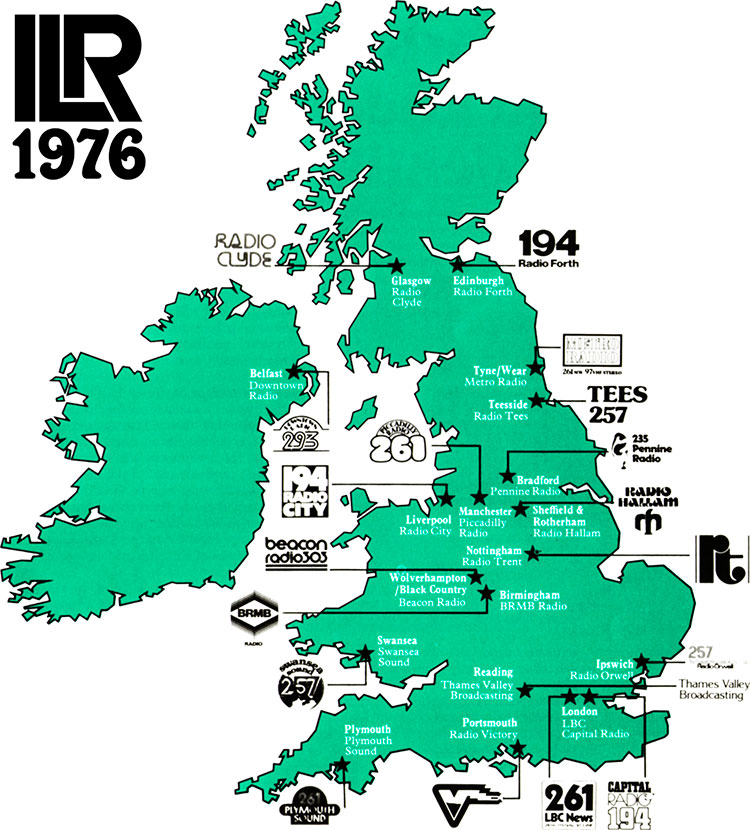 In 1970 a new Conservative government started to change the broadcasting structure and by 1973 the UK saw Independent Local Radio start to appear with the likes of LBC 8th October 1973 (Talk Station), then Capital Radio (Music Station) from the 13th of October 1973. Later more ILR stations rolled out across the UK. This was radio as it should be, designed so local people had access and influence to their local radio stations along with employment opportunities. These stations also provided cost effective advertising for local small businesses who are the backbone of the UK. On the all new ILR, it was top 40 pop music on the playlist with specialist music shows occasionally at night and the weekends only. This did not satisfy a vast amount of people who had a love of other music genres.
In 1970 a new Conservative government started to change the broadcasting structure and by 1973 the UK saw Independent Local Radio start to appear with the likes of LBC 8th October 1973 (Talk Station), then Capital Radio (Music Station) from the 13th of October 1973. Later more ILR stations rolled out across the UK. This was radio as it should be, designed so local people had access and influence to their local radio stations along with employment opportunities. These stations also provided cost effective advertising for local small businesses who are the backbone of the UK. On the all new ILR, it was top 40 pop music on the playlist with specialist music shows occasionally at night and the weekends only. This did not satisfy a vast amount of people who had a love of other music genres.
Unlicensed land based broadcasters came to air to try and provide this service. One of the first to appear was Radio Jackie on MW (London South West) who started to provide professional community type broadcasting services from March 1969. Soul Music has one of the biggest followings in the world here in the UK, but had little airtime. Radio Invicta based in London came to the airwaves in the 70’s with the UK’s first soul music station on Sunday afternoons and bank holidays broadcasting only on VHF. Sadly like all unlicensed radio stations Invicta was raided often by the (RID) Radio Interference Department who had the job of removing unlicensed broadcaster and was taken off air often. By mid 1981 Invicta’s broadcast hours where diminishing fast. That October saw two new soul stations appear in London, JFM was more specialist in it’s approach to soul music featuring Jazz, Jazz Funk, and the heavier soul album tracks on their playlist. JFM, live from morning to night on Sundays, quality too on 94Vhf Fm. October 1981 saw Horizon Radio appear on 94.4Vhf Fm which featured more of the mainstream soul music from old favourites right up to the latest imports that were selling in the ever expanding specialist soul music shops springing up across London due to the demand Invicta, JFM and Horizon Radio had created.
Horizon and JFM got their listeners to write to their MP’s and petition the government to try and make the stations fully legal. At this time the stations were only broadcasting on Sundays and Bank Holidays. Both stations had built up large followings of soul music fans. Horizon Radio then added Wednesday nights to their broadcast schedule in the summer of 1982. At this time Medium Wave was the most listened to radio frequency in the UK, but times were changing. VHF FM tuners were now becoming available and better quality was now on offer to the listening public including stereo. Invicta, JFM and Horizon Radio all broadcast on VHF which covers 88Mhz to 108Mhz also know as band 2 in the radio world. Most countries all around the world had set aside Band 2 for radio broadcasters, but not here in the UK. The UK band 2 was just 88Mhz to 97Mhz (approx). Police and other used the top end of Band 2. In 1984 things changed, police and others were moved off Band 2, thus that area became available to Radio Broadcasters.
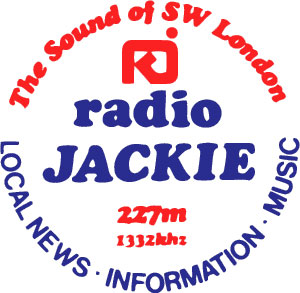 Radio Jackie on medium wave, first found the loophole in the 1949 wireless telegraphy act during 1983. Skyline soon followed on MW and FM. Horizon Radio, JFM and others followed. The existence of these new unlicensed radio station’s who had built up a massive following of listeners clearly demonstrated to the broadcasting authority that there was need for change in radio. In the background, support for a new wave of radio licenses was building, all it needed was cooperation and keeping things on the straight and narrow.
Radio Jackie on medium wave, first found the loophole in the 1949 wireless telegraphy act during 1983. Skyline soon followed on MW and FM. Horizon Radio, JFM and others followed. The existence of these new unlicensed radio station’s who had built up a massive following of listeners clearly demonstrated to the broadcasting authority that there was need for change in radio. In the background, support for a new wave of radio licenses was building, all it needed was cooperation and keeping things on the straight and narrow.
With band 2 now open from 88Mhz to 108Mhz the unlicensed stations move up band to the clear area where the signal they transmitted reached even further as no interference. London at last got full stereo from these unlicensed stations. Moving up band may not have been a good idea at this time as two problems soon showed up. Most people in those days listened to MW hence BBC Radio One only broadcast on MW and occasionally on Radio2’s Vhf. The other problem which was more serious was interference to the Gas Board communication system. 3 stations were involved in the interference Skyline, JFM and Horizon Radio.
March 1984 saw the RID visit Horizon Radio at the transmitter site due to the Gas Board interference problem. When it became know there was a problem. Horizon was told to speak to the Gas Board which the engineers did. The interference problem was identified by an Horizon Radio engineer working with the Gas Board engineers. The problem was simply the Gas Board communications system were fitted with wide band filters instead of a narrow band filter. Because of the close proximity of the JFM, Skyline and Horizon Radios transmitters to the Gas Boards receivers interference was caused. After tests by Horizon Radio and the Gas Board engineers working together, it was found that any frequency above 102.6Vhf caused the problem. Horizon Radio moved from 104 Vhf down to 102.5 Vhf and no longer caused interference. The Gas Board were more that happy with Horizon Radio’s cooperation, even recommending the station as a responsible broadcaster to the minster in the UK government in charge of broadcasting.
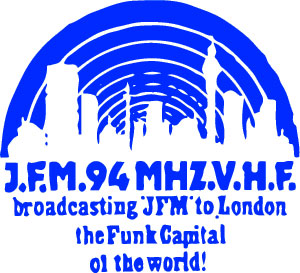 JFM & Skyline were asked to speak to the Gas Board, but refused to, so interference problem continued and that really put that cat almost the pigeons. The Gas Board one of the biggest company’s in the UK were not happy as they were loosing thousands of pounds a day, so took things to the High Court and the DTI. In the late summer of 1984 a new broadcasting act came in to effect. That resulted in the biggest raids ever on the unlicensed radio stations from the RID. Even after that there was still hope. July 1985 saw the announcement many had worked so hard over the years to achieve. The new community radio licenses.
JFM & Skyline were asked to speak to the Gas Board, but refused to, so interference problem continued and that really put that cat almost the pigeons. The Gas Board one of the biggest company’s in the UK were not happy as they were loosing thousands of pounds a day, so took things to the High Court and the DTI. In the late summer of 1984 a new broadcasting act came in to effect. That resulted in the biggest raids ever on the unlicensed radio stations from the RID. Even after that there was still hope. July 1985 saw the announcement many had worked so hard over the years to achieve. The new community radio licenses.
By then behind the scenes of the then unlicensed radio network it was far from the straight and narrow. There were a number of investigations going on by the police, some even implied Special Branch were looking at things “Subversive Elements”. It was utter stupidity by a few and how on earth they thought they could get away with it beggars believe. The final end to those new community radio licenses came when Solar Radio forged documents to say they were the biggest radio station in London, when it was very clear they were not even in the running for that top slot. That upset the BBC and local radio operators as they were at that time and they made it known to the authorities their thoughts. That was it, due to silly selfish people, those community radio licenses were cancelled in 1986.
That was a big mistake on behalf of the broadcasting authority’s, as there were a few applications that deserved a chance and if they had given those applicants licenses, what came next would never have happened. Over the next 4 years the unlicensed network went from bad to worse. New unlicensed broadcasters appeared and so did the dreaded Payola, the rave stations that organised raves simply to sell drugs along with the BMPS.
4 years went by before the Broadcasting authority would try again with new licenses in 1990 and the first legal soul station was born.
 31 March 1990
31 March 1990
The first licensed independent Black music soul radio station started broadcasting to London on the 31st of March 1990 almost 2 decades after Radio Invicta became the first Soul Funk station in the UK and JFM, DBC & Horizon Radio had paved the way. The co-founders of Choice FM were Patrick Berry and Neil Kenlock.
The station went on to amass a listener-ship of around 277.000 and became a firm favourite of soul music fans from the old days. A second license saw Birmingham’s Buzz FM come to the airwaves.
Then the UK Government wanted broadcasters to transfer to digital broadcasting and the station said it needed a cash injection to meet the investment requirements of digital broadcasting, said to be over £2 million pounds. This opened the door for Global Radio (Capital Radio) to get involved and later they took the station over thus the name was no more. This also saw Independent radio start to go the corporate way.
 1 September 1990
1 September 1990
Gordon Mac was the head of the station. Gordon was in 1983 the resident DJ at Kisses nightclub in Peckham South London and saw close up the success of Horizon Radio when Horizon held it’s first alldayer at Kisses, Easter 1983. 2 further full house alldayers were held at Kisses by Horizon Radio and Gordon was present at all 3.
With many of the other soul stations closing down in September 1985 to apply for a license, Gordon Mac launched Kiss on the 7th of October 1985. In 1988 Kiss applied to the IBA for a license and this application was turned down.
Kiss this time with Richard Branson and EMAP who owned magazines and two radio stations in their portfolio behind the station, Kiss applied again. This time creating history by taking a pirate radio station into the legal radio ownership. EMAP took full control in 1992 Gordon Mac left the station in March 1998.
1967, BBC Radio One and Two is up and running on limited hours broadcasting due to PRS/PPL, Then the BBC start to get involved with local radio first with eight locations chosen to take part in this experiment. Radio Leicester (which launched on 8 November 1967); Radio Sheffield (15 November 1967); Radio Merseyside (22 November); Radio Nottingham (31 January 1968); Radio Brighton (14 February); Radio Stoke-on-Trent (14 March); Radio Leeds (24 June); Radio Durham (3 July). There was no funding for this.
The BBC would pay for setting up the stations but local authorities would be encouraged to meet the running costs<<<<. The Sunday Times called the process ‘a astonishing three-stage Dutch auction‘. Did the BBC just want to monopolize the radio frequency’s, as coming soon was the all new ILR. Tax payers money being wasted again as the BBC had a broadcasting monopoly.
Independent Local Radio, that was the best idea the Independent Broadcasting Authority (IBA) ever had, as it gave radio to local community’s. It also gave employment to local people and helped local small businesses who are the backbone of this country a chance to advertise at reasonable rates. The Idea grew across the country and provided much needed services to those who needed them in that local area. At last the UK was getting what other countries had been given decades before and that was radio for the people.
As time went on things changed and changed for the worse. Ofcom took over from the IBA and it all started to go corporate which was against the regulations as we all saw in the Choice FM case and Capital Radio takeover. What on earth are Ofcom thinking or did green stuff change minds? Today its all Corporate with the likes of Global Radio and Bauer Media (German Company) owning the majority of radio stations in the UK. Long gone are the employment opportunities of locals and local small business interests as most of the output comes from London and the locals don’t get a say any more.
Community radio finally gets going on a small scale, by 2010, 228 stations had been licensed, these new licenses covered a small area approx 5km from the transmitter location. Many of the stations are run on a not for profit basis. Funding, no community radio station is permitted to raise more than 50% of its operating costs from a single source, including on-air sponsorship and advertising. If a community radio station lies totally within the transmission area of a commercial radio station with a population coverage of under 150,000, no sponsorship or advertising may be sought and all funding must come from alternative sources. In a small number of areas where a commercial station covers a population of under 150,000, a community radio station may not be licensed at all. This protects the financial interests of smaller commercial stations. What is the point of having these restrictions placed on Community radio stations if they cannot work for the community with local advertising and employing local staff?
Those smaller community stations today are falling into the hands of the corporate company’s at an ever increasing rate as we saw with Choice FM and others. There were supposed to be regulations to stop this happening, but it seems Ofcom change these rules to suit the corporate company’s more often that they change the loo rolls in their toilets.
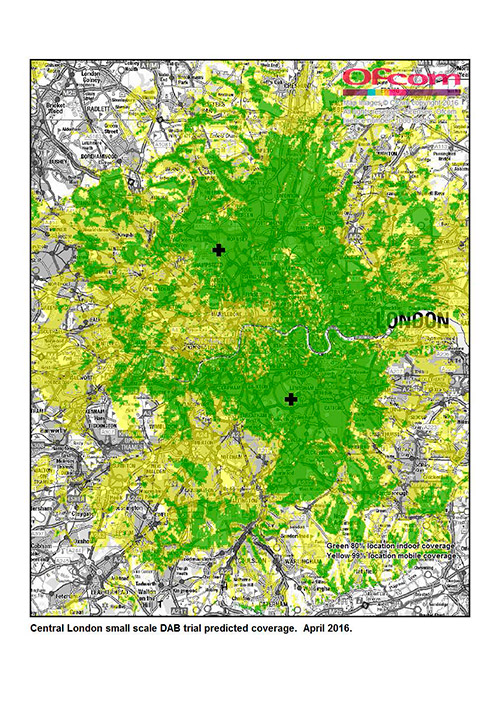 Talking Radio Digital Radio.
Talking Radio Digital Radio.In 2020, Ofcom began to issue licenses for small-scale DAB multiplexes. These are intended to offer a low-cost route into digital radio for small-scale community radio stations, as well as the small number of small-scale commercial radio stations. Ofcom says that digital radio is the way to go, or was it another money making exercise for the few? Not only have Ofcom taken away local radio along with employment opportunities for locals and cheaper advising for local businesses, they have also taken radio back to the Medium Wave days with low quality broadcasting. Many of the digital broadcasts are in mono or close to it, reception is as intermittent as it comes. Just to partly cover London, you need two of these low powered transmitters.
So back to the tower block days as that is where these utter waste of time transmitters are located. Around the globe, digital has not been embraced and the Irish broadcaster RTÉ, (Raidió Teilifís Éireann) has even ditched its digital broadcasting service as the take up is so predictably low. Other counties are doing the same.
If Ofcom or its predecessor had done the job properly in the first place and zoned the country and not let the BBC become a monopoly, we could have many more quality radio stations. Go and tune around the dial in many other countries and just count how many radio stations they have in cities smaller than London. back in the 70’s Los Angeles had around 80 stations and that was on the old MW and VHF.
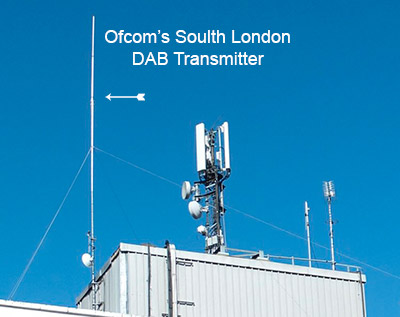 Ofcom said the MW and VHF transmitters would be switched off in 2020. The corporate company’s start moaning and now Ofcom say those transmitters will stay on until 2032. They should never be switched off, there is no reason to switch off as those transmitters as they can be driven by renewable energy on site if needed to be. They are only low power anyhow. If you want low quality broadcasting do it the Ofcom way. Don’t be surprised if they come up with a brand new idea of 2 tin cans and a ball of string as the way of the future.
Ofcom said the MW and VHF transmitters would be switched off in 2020. The corporate company’s start moaning and now Ofcom say those transmitters will stay on until 2032. They should never be switched off, there is no reason to switch off as those transmitters as they can be driven by renewable energy on site if needed to be. They are only low power anyhow. If you want low quality broadcasting do it the Ofcom way. Don’t be surprised if they come up with a brand new idea of 2 tin cans and a ball of string as the way of the future.
At the moment there are few restrictions on radio streamed over the web, but times are changing as we have seen recently. Right now anyone can start a internet radio streaming service from as little as $29.50 a month. Over the last year here in the UK we have seen the service from these stations on the web more that double with some great stations out there and some close to illegal ones too. The biggest problem with internet radio is the fact that it is a pay to listen service. Here in the UK we have over 1.5 million homes not connected to the internet for various reasons. One of those reasons is location. Mobile services via the likes of Vodafone and EE also do not cover the whole of the UK. Those who live in big cities have no Idea what its like to make a telephone call via a mobile phone for those who live out in the villages and small towns across the UK. We can tell you, it’s a trip out in the garden in many areas just to make that call. So how are these people going to listen to radio, stand in the garden all day perhaps.
There are millions of users who also use the mobile services and due to their financial situations cannot afford the bandwidth charges on their mobile phone accounts. So they also do not listen to radio. The sad thing is many mobile phones have or had an Vhf Fm chip in them but the ISP’s do not want those chips enabled as it would cut their profits.
Ofcom where are you on this? from where we sit and are looking in it seems Ofcom are in the Corporate Radio Owners pockets and to hell with the tax paying citizens of the UK.
There needs to be a big shake up with Ofcom as it appears they just do not know what they are doing.
Talking Radio Broken Dreams Share With Friends
If you have a story to tell about Horizon Radio London or want to share photo’s to include on this website, please email us from here with your content or suggestions. If you send content to us, we will assume you give authority to publish. Please do not send content that is not to be published.